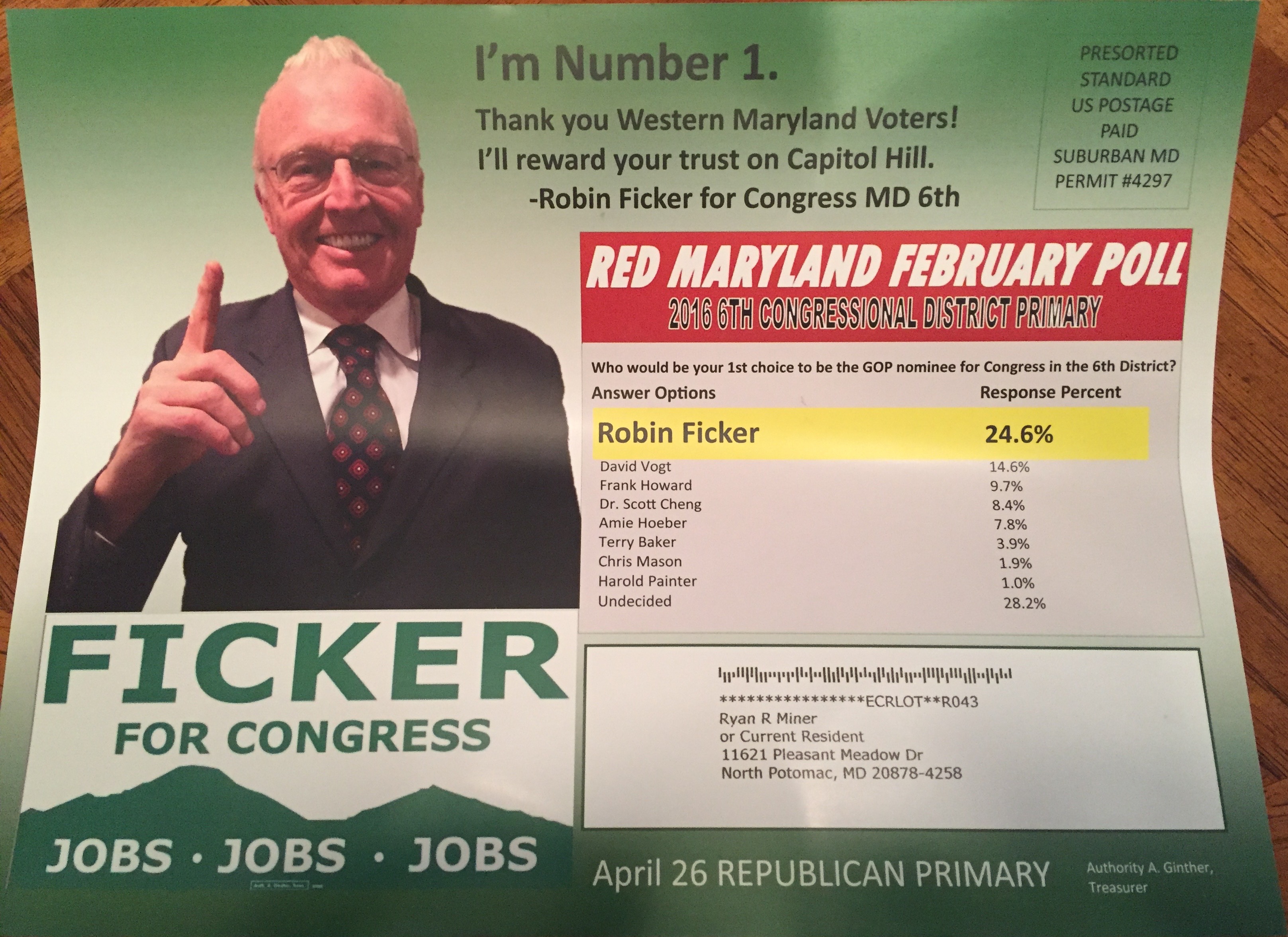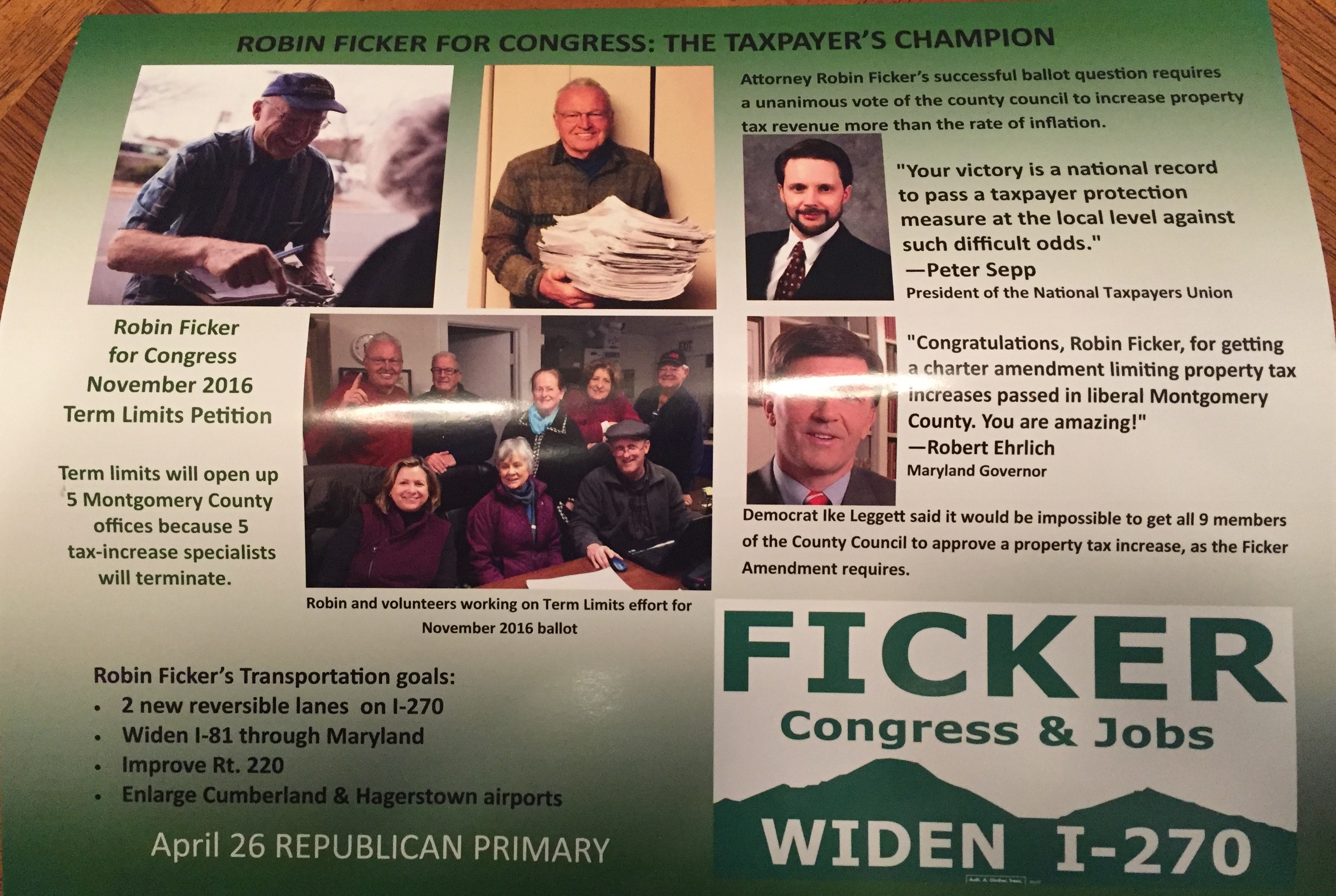By Ryan Miner
To my surprise, a campaign mailer from Robin Ficker made its way into my mailbox today.
A two-sided copy of Ficker’s campaign mailer can be seen below:
Side 1:

Side 2:

I want to know just one thing. Who is paying for Ficker’s mailer? He hasn’t raised any money this cycle, according to the latest FEC filings. I assume Ficker is spending his own money on his campaign signs and mailers.
So what’s wrong with Ficker’s mailer? Plenty.
For starters, Side 1 is aesthetically unbearable. Ficker’s use of a Red Maryland poll is pathetic. To claim he’s the “Number 1” candidate in the 6th district Republican primary is laughable and sad – and vehemently untrue. Not a single person voted for Ficker in the straw poll at the Federick County GOP congressional debate. Not even one. Ficker didn’t even vote for himself.
Maryland candidates running for public office who cite an online “poll” conducted by Red Maryland, the least respected and least trusted media outlet in Maryland, should be taken about as seriously as Brian Williams’ wartime adventures.
Turn to Side 1. The oversized photograph of Ficker’s notoriously weird one-finger salute reminds voters of why they rejected him for public office – over and over again – since the late 70’s. Look below at Ficker’s misplaced “FICKER FOR CONGRESS” graphic. Why wouldn’t the company who produced Ficker’s mailer enhance his logo or demand a better file format? The logo included in Ficker’s mailer is grainy and pixilated. The mailer appears to be cheap and rushed. If I were Ficker, I would ask for my money back.
Now switch to Side 2. Who thought it would be a smart idea to arrange the photographs on the left side as they are? And check out the caption below the picture of Ficker’s alleged volunteers: “Robin and volunteers working on Term Limits effort for November 2016 ballot.” An indefinite article desperately yearns for a home.
On the bottom left of Side 2, Ficker lists his “Transportation goals.” Scroll down to the fourth bullet point. Ficker endeavors to “Enlarge Cumberland & Hagerstown airport.” That seems like a reasonable goal, doesn’t it? Except, Cumberland doesn’t have an airport. The Greater Cumberland Regional Airport, according to Google,” is a public airport in the town of Wiley Ford in Mineral County, West Virginia,” located in West Virginia’s 1st congressional district. Either Robin Ficker doesn’t have access to Google maps, or he’s interested in fighting for tax dollars to be spent in West Virginia. I’m sure Congressman David McKinley appreciates Robin Ficker’s help.
I’ll get to the meat and potatoes of this article shortly, but stay on Side 2 and scroll down to the photograph of former Maryland Governor Bob Ehrlich. Ficker used a stock photograph of Ehrlich and included a quote allegedly uttered by Gov. Ehrlich to commend Ficker on his Montgomery County property tax charter amendment. I’m going to reach out to the former Governor and inquire as to whether the quote is accurate.
It is interesting and somewhat ironic that Ficker used Ehrich’s photograph and quote in an attempt to bolster his congressional bid. According to a Baltimore Sun article from 2004, Ficker was readying to mount a primary challenge against Ehrlich in 2006.
From the Baltimore Sun:
“Robin Ficker, whose most recent campaign was a failed effort to win the GOP nomination for Maryland’s 8th Congressional District, cryptically announced plans yesterday to put together a primary challenge to Ehrlich in the 2006 gubernatorial election.”
Here’s the most serious issue with Robin Ficker’s campaign mailer:
It is in violation of Federal Election Law.
First, check out the nonexistent authority line. Where is Ficker’s authority line? You see it? No? It doesn’t exist. The authority line used on Side 1 of Ficker’s campaign mailer isn’t an authority line at all.
According to Federal Election Law (11 CFR 110.11), all public election communications have to do two basic things: (1) They need to state who paid for the communication and (2) who authorized it. That’s why every campaign ad ends with “I’m Joe Smith and I approve this message.”
The same doesn’t just apply to television advertisements, however; it applies to all public communications, including newspaper ads, billboards, telephone banks and (most importantly in this case) mass mailings.
The disclaimer rules for mailers are very simple: if a candidate paid for and authorized a mailer, the mailer should clearly state “Paid for by Joe Smith for Congress.” If another individual, campaign committee or PAC paid for the mailer, then the mailer would need to state who paid for it and who authorized it. Any candidate, individual or SuperPac must follow this rule to be in compliance with FEC law.
To reiterate: all federal campaign mailers must state who paid for it and who authorized it. Painstakingly simple.
The law states the disclaimer must be placed in a clear and conspicuous place, meaning the disclaimer cannot be overlooked; nor can the disclosure be hidden. For printed materials, the disclaimer must appear within a box set and apart from the other content included within the mailer. The disclaimer must be of a sufficient type size, and it must be clearly readable by the recipient. Finally, the mailer must have a reasonable degree of color contrast, against the background.
Nowhere included within Robin Ficker’s campaign mailer does it state who paid for the mailer, and there is no text box with a clear and legal federal disclaimer. Ficker’s mailer ignores all the basics of federal election law.
Here are two screen shots that show the exact language from the Federal Election Commission:


Why does any of this matter?
Because Robin Ficker is a candidate for Congress. Robin Ficker is an attorney and should be held to higher standards. He’s running for an elected body that entitles him to write our nation’s laws. How can Robin Ficker be trusted to write our laws when he fails to follow the laws as written? Federal election law is pretty cut and dry. The law articulates what candidates can and cannot do when communicating with voters. Robin Ficker has run several times in the past for federal office. By now you would think he understands federal campaign law.
Maybe not.
Ficker’s law license has been suspended twice in the last twenty years. Many of Ficker’s campaign signs throughout the district are placed without a property owner’s permission. And even his 4×8 campaign signs are suspicious (more on this later).
When is Robin Ficker going to learn to follow the basic rules of campaigning for federal office?

